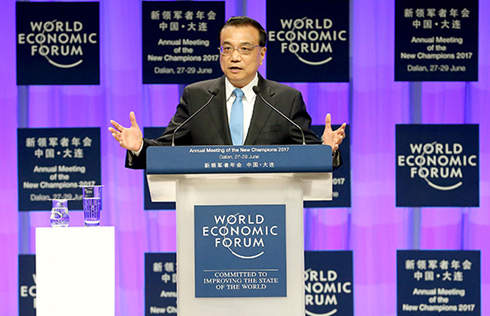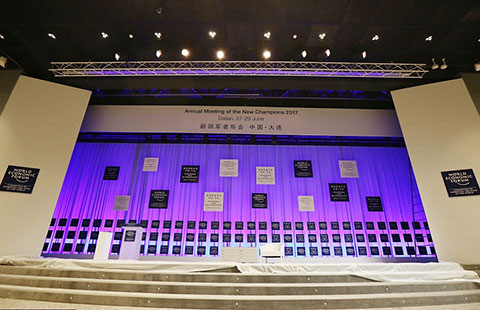A golden era for the HK stock market
 |
|
The Hong Kong University of Science and Technology has the highest population of international students among local universities. [Photo/Agencies] |
The bourse has become a magnet for mainland companies looking to list
The wave of Chinese mainland businesses that have headed south in the past 20 years, flooding Hong Kong's stock market, sending market capitalization to record highs, has led to a historic remaking of the local bourse.
The scramble for funds from initial public offerings, along with the tide of mainland capital flooding the city's securities markets, has been propelled by China's opening-up policies and the desire of mainland businesses to walk the global stage.
The number of mainland enterprises that have gone public in Hong Kong has skyrocketed from 101 in 1997 to more than 1,000 last year - more than half the total number of companies listed in the city - with the market values of mainland companies rising from about 20 percent to 63 percent of the city's total market capitalization.
Charles Li Xiaojia, CEO of Hong Kong Exchanges and Clearing Ltd, which operates the city's bourse, has observed the city's evolution from the mainland's fundraising center into the nation's global wealth-management hub, top offshore risk management center and global asset pricing pivot.
"In the past two decades, Hong Kong has developed from a regional market with regional companies listed on the exchange for local investors and limited foreign investor involvement into an international financial center. It's attracting not just international, but also mainland funds," he said.
What has transformed Hong Kong, according to Li in a 2013 interview with Jeffrey Garten of the Yale School of Management, is the ability of both the city's and the mainland's regulatory authorities to make decisions to encourage State-owned mainland companies to float in the city.
Working together, they developed the H-share concept - special regulations that initially allowed State-owned enterprises to list in Hong Kong, governed by international standards. It triggered a flood of listings of State-owned companies, followed by those in the private sector, using the city as the first stop in their global aspirations.
First H-share IPO
In 1993, Tsingtao Brewery Co, the mainland's second-largest brewer, fired the first salvo by going public on the Hong Kong Stock Exchange as the first H-share enterprise.
During the 2013 interview, Li said the mainland was still a plain economy, lacking company or securities laws, and it needed capital and ways to reform the State-owned sector.
Today, mainland companies play a far more vital role in Hong Kong's capital markets.
According to HKEx data, the number of Hong Kong-listed companies soared from 658 in late 1997 (with only 101 listed mainland enterprises), representing 15 percent of the total, to approximately 2,009 by the end of March. More than 1,000 mainland companies had floated in Hong Kong by the end of last year, accounting for 51 percent of the total.
Total market capitalization had risen from HK$3.2 trillion ($410 billion) at the end of 1997 to HK$27.2 trillion by March.
The average daily turnover on the bourse has risen from HK$15.5 billion to HK$82.1 billion.
Total funds raised through IPOs, along with funds raised from 1997 until April 30, reached HK$8.7 trillion, with mainland enterprises, including H-shares, red-chips and private businesses, securing HK$5.4 trillion, or 62 percent of the total.
According to Bloomberg, nine out of 10 IPO underwriters are from the mainland, with China Construction Bank Corp, Haitong Securities Co and Agricultural Bank of China Ltd heading the list. In 1997, Morgan Stanley, HSBC Holdings and Merrill Lynch were the leading IPO underwriters among the top 10, which included only local and international companies.
Hu Zhanghong, chairman and chief executive officer of CCB International (Holdings) Ltd, said that Hong Kong's status as an international financial center has been further strengthened after the handover, especially over the last decade. The city has attracted enormous mainland capital, becoming the top destination for mainland enterprises looking to raise funds offshore.
"Hong Kong is the 'super-connector' between the mainland and the rest of the world. It has also evolved into a strategic platform for renminbi internationalization and the Belt and Road Initiative," he said.
Banks flood in
Hong Kong government statistics show that by the end of last year, mainland banks' assets in Hong Kong accounted for approximately 33 percent of the local banking system, compared with 13 percent in 1997. Currently, almost all State-owned and national joint-equity commercial banks have branches in Hong Kong.
According to the Hong Kong Chinese Enterprises Association, the city currently hosts nearly 4,000 mainland companies - double the number in 1997 - with total assets rising 22 times to almost HK$20 trillion.
Yim Fung, chairman and CEO of Guotai Junan International Holdings Ltd in Hong Kong, said since the collapse of the city's largest brokerage, Peregrine Investment Holdings Ltd, in early 1998, the China Securities Regulatory Commission - the mainland's securities watchdog - has encouraged financial enterprises to innovate and prompted them to "go out" by 2006. As a result, the number of mainland-owned brokerages in Hong Kong has surpassed their local and foreign peers in recent years.
Hong Kong's stock market has overcome storms, such as the 1997 Asian financial crisis, the burst of the internet bubble in 2000, the 2003 SARS outbreak and the 2008 global financial crash.
On June 27, 1997, the last trading day before the handover, the Hang Seng Index - the barometer for the local market's performance - stood at 15,196 points. On Dec 29, 2006, it passed the 20,000-point barrier for the first time, before hitting a record 31,958 on Oct 30, 2007.
Cheah Cheng Hye, co-chief investment officer of asset management company Value Partners, said Hong Kong-listed stocks are still relatively cheap because they trade at about 14 times earnings capacity.
Moreover, there's an average discount of 25 percent for mainland companies with dual listings, and Hong Kong listed shares are a good buy compared with those listed on the mainland.
"In the long term, Hong Kong's capital could become very exciting thanks to the potential offered by Belt and Road projects, and the development of the Pearl River Delta economic zone," he said.



















